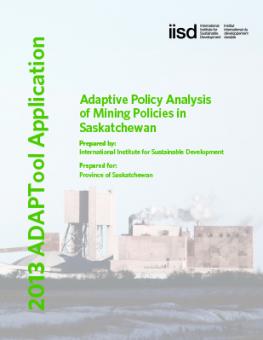
Adaptive Policy Analysis of Mining Policies in Saskatchewan
The Adaptive Design and Policy Assessment Tool (ADAPTool) is an Excel-based online tool developed by the International Institute for Sustainable Development and partners as a structured guide through an assessment process that compares existing policies and programs to the characteristics of adaptive policies. ADAPTool assesses policies or programs in relation to a defined stressor or external change. It produces two kinds of assessments: 1) it gauges the ability of existing policies or programs to support adaptation measures undertaken in response to the specified stressor by the policy target groups; 2) it assesses the general adaptability of the policies or programs themselves, which is to say, whether they are likely to respond well under the influence of the defined changes as well as under unforeseeable changes in the future. ADAPtool builds on IISD-led research on Creating Adaptive Policies.
In this pilot application, ADAPtool for existing policies was applied to a suite of nine mining-related policies in Saskatchewan. IISD and a consultant from the Water Security Agency of the Province of Saskatchewan worked together to conduct the ADAPtool analyses, including: initial project scoping (including choice of policies to be analyzed); training on use of ADAPtool; literature review and vulnerability assessments for the forestry-relevant sectors; adaptation analysis, adaptive policy analysis and final reporting on results.
This pilot analysis revealed strengths and weaknesses of policies around contributions to mining adaptation needs and policy flexibility. A total of 44 vulnerabilities were identified for the mining sector, along with 66 adaptation actions for each to address these vulnerabilities. Of these adaptation actions, 13 were directly supported by at least one policy in the suite and 59 were indirectly supported by at least one policy. Many actions had indirect support from more than one policy. All but one policy had moderate support for self-organization and networking., and all policies were generally sufficiently decentralized. Only one policy had no multistakeholder consultation support, but there is a plan in place to repeal it and include it in another policy, which will likely lead to more multistakeholder elements. There was little evidence of the deliberate use of foresight methods. Most of the policies could improve in their frequency and formality of review process, as well as the availability of reports and results.
Participating experts
You might also be interested in
Tree Planting for Climate Resilience in Freetown, Sierra Leone
This assessment presents the economic valuation of tree planting efforts in Freetown, Sierra Leone, including planting costs, added benefits, and avoided costs.
Sustainable Asset Valuation of Sherwan Hill Adventure Park in Abbottabad, Pakistan
This report analyzes the social, economic, and environmental benefits of the Sherwan Hill Adventure Park in Pakistan.
December 2024 | Carbon Minefields Oil and Gas Exploration Monitor
In November 2024, 23 oil and gas exploration licences were awarded across five countries, with Russia granting the licences that account for the largest portion of embodied emissions.
Toward a Coherent, Transformative Approach to Financing Sustainable Development, Climate, and Nature
Four key proposals for the Fourth Financing for Development Conference (FfD4) to create an integrated, equitable approach to financing climate, nature, and development goals.